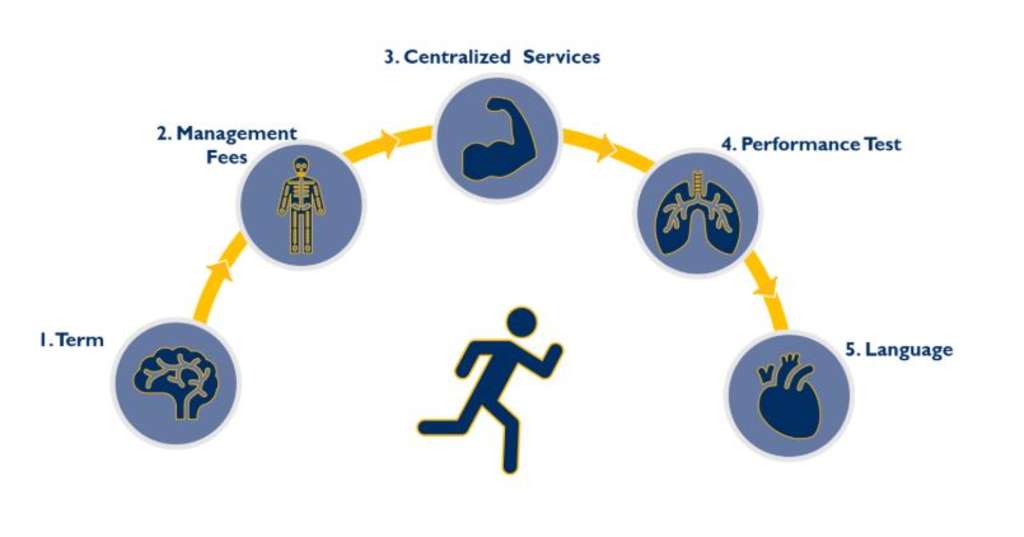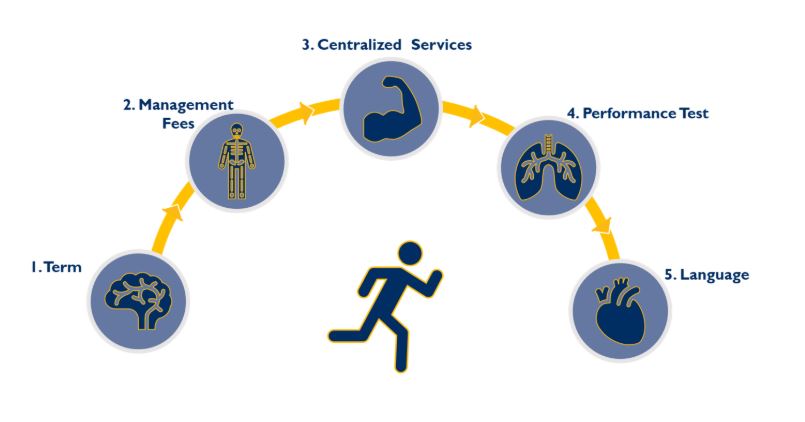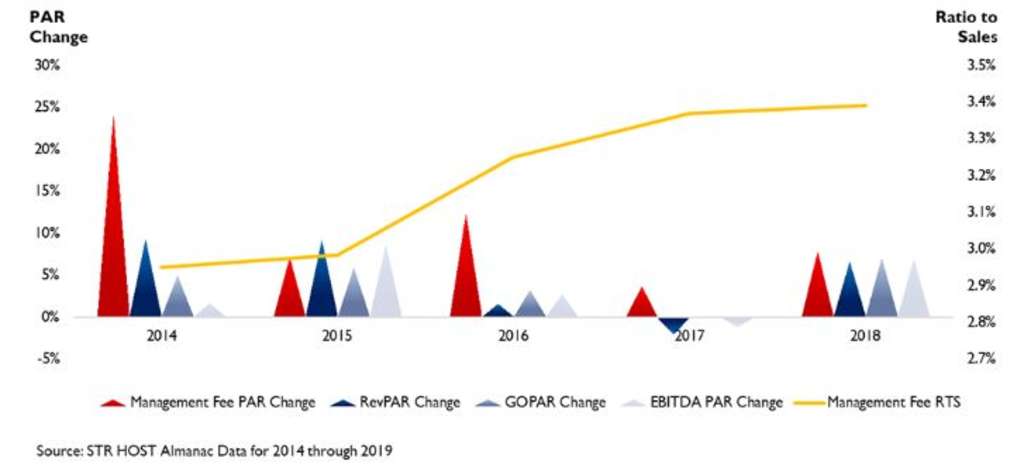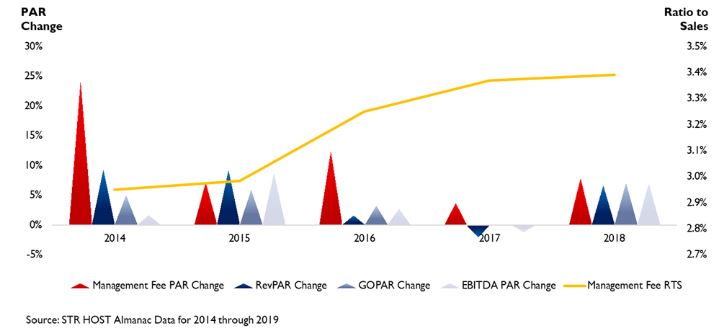Hotel Management Agreements - Creating a Win Win Relationship

An ounce of prevention is worth a pound in cure
As a wave of uncertainty overtakes consumer sentiment, investors are using this time to pause and reflect on their assets. Some hotel Owners have concluded that there are areas of improvement at their hotels that would help in maintaining the asset's value through these troublous times. One course of action is the review and revision of the contracts or agreements that impact their hotel's operations, and they are wise to do so. Most notably, the Hotel Management Agreement (HMA) is at the top of our clients' reading list.
Since the Great Recession, the terms of executed HMAs have become increasingly one-sided in their writing, as Owners and Operators gradually forgot the economic hardship and attitudes grew in stride with the U.S. equity markets. As market outlooks shift, Owners and Operators of hotels will need to maintain a composed approach while assessing and negotiating the HMA.
Although Owners and Operators are often focused on their success, it would better serve their interests to establish synergies through a mutually accommodative relationship.
Why is it essential for the HMA to be a win-win?
- In this unprecedented time, hospitality is proving to be one of the most impacted industries, which is causing equity investors to stagger or find alternative placements. Owners and Operators must show cohesive determination and pronounced trust to rejuvenate investor confidence.
- A win-win agreement mitigates the risks associated with operating a hotel. Through the lens of market values, this would translate to enhanced value or a better return on investment.
- During this crisis, Owners are increasing their involvement in the daily operation. Not that they are choosing to micro-manage, but the growing risk and uncertainty of their substantial investment are building pressure.
In executing or amending the HMA, it should secure the faith and trust between the Owner and Operator. Resulting in an Owner that can relax, and an Operator can operate without interruption.
Anatomy of a Hotel Management Agreement
1. Term (Brain)
A lesson that we as an industry are relearning from the COVID-19 pandemic is that the only constant is change. It is increasingly obstinate that the Owner's and Operator's objectives will remain in line with what they were when the HMA was executed. The Owner and Operator may increase the size of their firms at different paces, which will influence their expectations and ability to deliver on those expectations. However, too short of a term will lead to management myopia, whereby the Operator would focus on obtaining short-term gains rather than long-term profits.
An example might be the Operator reducing sales and marketing efforts and/or repairs and maintenance to achieve a higher profit within the term, but impact revenue generation and expense control post-term.
An HMA with an initial term exceeding five years and a high cost of termination can restrict an Owner's ability to trade the asset at a critical time. If the terms cannot be short or shortened in any capacity, then there must be minimal liquidated damages upon termination under specified circumstances.
Where a shorter length for the initial operating agreement is becoming standard, so has the provision for extensions of the operating term. These extensions are usually limited to two extensions at, or less than, the length of the initial term. A provision for extensions allows the Owner and Operator to continue a favorable relationship.
2. Management Fees (Bones)
Typically consisting of base and incentive fees, the management fees paid are designed to compensate the Operator for managing the hotel and reward them for helping the Owner exceed their financial objectives. This is the primary compensation paid to the Operator through the hotel and is a core component of the HMA. Without including benefit to the Operator, the contract would lack partial consideration.To create a win-win scenario, an HMA should utilize a creative fee structure that connects the Operator's responsibilities with the reward. The incentive fee's structure should be determined by the scale and complexity of the Operator's responsibility for managing the hotel. A considerable amount of resources and talents would be required to manage a full-service hotel with various amenities and outlets as compared to a limited-service hotel that only requires the Operator to manage the rooms department.
Incentive fees should be rewarding but fair, where "fair" is subject to the financial goals of the Owner and Operator. Establishing the fairness of the incentive structure would provide insight into whether this agreement would lead to a mutually beneficial relationship.
One other area of evaluation would be the minimum base fees, which are typically a fixed amount paid to the Operator, should the base management fee as a percentage of total revenue fall below a specified threshold. The minimums used for these fees should be such that the Operator has sufficient funding to meet their fiduciary duties to the hotel Owner and offset the Operator's corporate overhead expenses, which are not already being offset by the fees charged for auxiliary services. Minimum fees should not be such that the Operator has hedged the downside. Share in the risk, share in the reward.
Using hotel benchmark data from the STR Host Report, we measured the growth in total management fees paid to the Operator from 2014 to 2018. Management fees paid on a per available room (PAR) basis outpaced growth in RevPAR, GOPAR, and EBITDA PAR during the period. Consequently, the management fees paid as a ratio to gross sales (RTS) has increased as well.
In 2009, EBITDA and GOP fell by 36% and 30%, respectively, whereas Management Fees PAR declined by 24%. The variance can be partially explained by the minimum base fees reducing the percentage decline in management fees.
3. Centralized Services (Muscle)
As hotel operations have become more sophisticated, so have the Operators and the offering of centralized services. This concept provides support services, or muscle, to the hotel on a shared basis by spreading the cost of delivering the service across participating hotels.Two commonly provided centralized services are accounting and revenue management services. Other services an Operator may offer include recruiting and training, technology and systems support, engineering and risk management, legal support, and special purchasing. A branded Operator may offer these services in conjunction with those provided in the franchise agreement or excluded entirely in the HMA.
Hotel Owners should be mindful of the size and support of the Operator. While it is necessary to kick the tires on the proverbial car, one must also know what lies under the hood. Matching power to product is essential. As an example, a 50-room limited-service hotel may not require all the bells and whistles, whereas, a 500-room conference hotel requires more support to place heads in beds.
The nature of these services is to enable the Operator to manage the hotel more effectively. The benefit received from these services should be earned through the enhancement of value created and not through their existence. Therefore, the Owner's cost of using the services should be such that it offsets the Operator's costs to provide the service.
4. Performance Test (Liver)
What has emerged to become standard practice, the performance test provides an Owner with the right to terminate the HMA, given that the Operator has not met the criteria set within the agreement. The most common performance tests are:- Internal Benchmark - Actual GOP did not exceed a percentage of budgeted GOP, usually at 85 or 90 percent.
- External Benchmark - Actual RevPAR falls below 90 percent of the designated competitive set's RevPAR.
The final element to the performance test is the time horizon for which consecutive failed tests can occur. From our experience, this is 12 to 24 months. It is critical to remember that failing does not trigger termination. The performance test provides the right to terminate, not the obligation.
What frequently accompanies the performance test is the right to remedy (or cure), which takes the form of the Operator compensating the Owner, using their own money, to bring GOP to the acceptable threshold. The right to remedy is not designed to make the hotel Owner whole but should be viewed as a way of maintaining the Owner/Operator relationship.
Firstly, the hotel Owner and Operator should work together to identify the root of the problem. Perhaps the variance was due to an unexpected increase in the competitor's RevPAR due to a repositioning or a dramatic shift in market demand.
The performance test should be considered as another tool to identify and resolve a problem at the property. Curing a loss or terminating the Operator is likely to be a temporary solution that may not appropriately address the underlying issues.
5. Language in the Agreement (Heart)
How does what is written in the HMA impact the Operator's ability to provide exceptional returns to a hotel Owner? Language is the heart of the agreement since it gives purpose and utility to the body of a contract. Too much favoritism to one side of the table can set the wrong tone during negotiations or even throughout the operating term.Some crucial questions that an Owner should ask regarding an HMA:
- Are the roles and responsibilities of the Owner(s) and Operator explained clearly without making the HMA inflexible?
- As market conditions change, does the HMA allow the right amount of flexibility given the length of the term?
- Does the agreement provide the Operator with enough leniency to operate the property without interruption?
- Does the agreement provide the Owner with enough power to terminate the Operator rightfully?
The language within an agreement should reflect the business plan and be the building blocks of how the relationship should function. That is to say that the Operator will run a successful business operation for the Owner. It is worth noting that the business plan should also represent the intent of the relationship. That means a business plan that includes an involved Owner should include language in the agreement, which is clear in duties and sets reasonable expectations.
Despite a strong focus on the relationship between the Owner and the Operator, this relationship is not a marriage; it is a business relationship. Even if the HMA were to be worded perfectly and inclusive of all details, the relationship could still fail due to a simple fact. If the relationship is not working, it would need to be resolved, or it should result in a separation. It provides no benefit to either the Owner or the Operator to persist in a lose-lose scenario.
What should an Owner do?
Knowing your investment objectives - E.g., know your holding period. If you plan to sell within three years after opening, the agreement should be negotiated to be distinguishably different from if you plan to hold the asset for ten or more years.
Know your asset before structuring the agreement - A hotel's Asset Manager should have a comprehensive view of the asset with precise knowledge on the asset's earning potential, expense structure, and risk exposure.
- Use meaningful hurdles.
- Insure identified risks.
Establish a mutual understanding and empathy - Perspective-taking helps the Owner and Operator to be reasonably aligned in their understanding of their roles regarding the property. Having an aligned interest does not mean the assuming Operator is a partial Owner or should accept the same risk level as the Owner. Putting aside the performance of the results, the Owner should recognize the efforts and resources that the Operator has put into operating the hotel.
Leverage with the experts - Now more than ever, it is necessary to have an objective and impartial look at your HMA. Find a hospitality expert with:
- An agreement database, particularly related to your counterparties.
- History with your counterparty that would strengthen your bargaining power.
- Extensive knowledge and experience in negotiating hotel management agreements.



